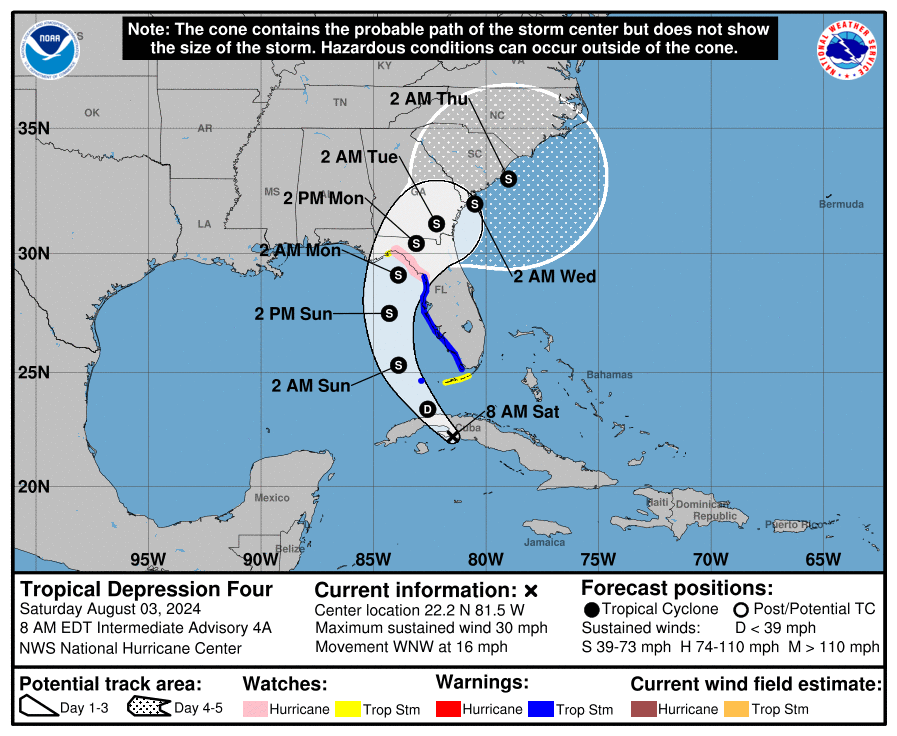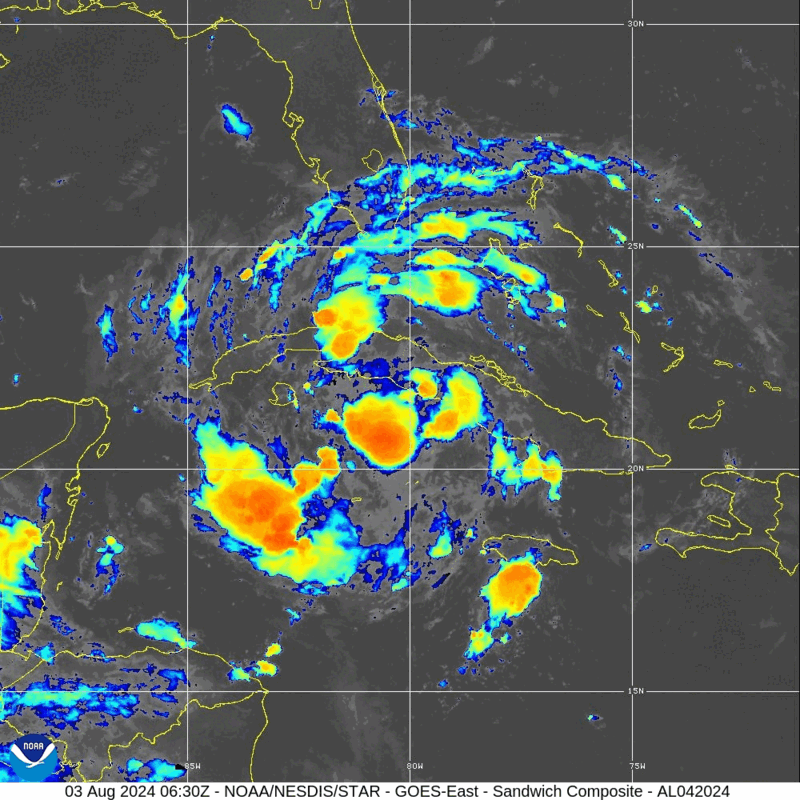Due to the effects of Tropical Storm Debby to affect Florida August 2024, you may want to consider delaying your travel — or, at least, keep yourself updated as to the latest information pertaining to the weather — if this region is in your travel plans over the next few days.
Tropical Storm Debby to Affect Florida: August 2024 Travel Alert
Maximum sustained winds of Tropical Storm Debby — which is currently approximately 160 miles south of Key West in Florida and moving west northwest at a speed of 16 miles per hour — are at 40 miles per hour, which means that it is currently a weak tropical storm. Landfall of what is forecast to become a strong tropical storm is expected to occur somewhere in the area of Steinhatchee in the Big Bend area of the state of Florida as soon as the early hours of the morning on Monday, August 5, 2024.

The maximum sustained winds of Tropical Storm Debby could reach as high as 70 miles per hour — which is only four miles per hour below Category 1 hurricane status — when landfall occurs on Monday; but any additional strengthening will officially designate it as a hurricane, which is a distinct possibility. The strengthening of this storm will be due to the temperatures of the waters of the Gulf of Mexico, which are currently experiencing record warmth and could help to fuel this tropical system to intensify rapidly.
The outermost bands of this tropical storm are already currently affecting portions of southern Florida as far north as the southern shore of Lake Okeechobee.
A Hurricane Watch is in effect for Florida from:
- Aucilla River to Yankeetown
A Tropical Storm Warning is in effect for Florida from:
- The Dry Tortugas
- West coast of the Florida peninsula from south of Yankeetown to East Cape Sable
A Tropical Storm Watch is in effect for Florida from:
- The Florida Keys south of the Channel 5 Bridge
- West of the Aucilla River to the Ochlockonee River
A Storm Surge Watch is in effect for Florida from:
- Bonita Beach northward to the Aucilla River — including Tampa Bay and Charlotte Harbor
Significant precipitation of up to 15 inches is possible in across portions of Florida and the southeastern United States, which is expected to result in considerable urban flooding and flash flooding.
Rough surf and strong rip currents are currently affecting much of the gulf coast of Florida. A storm surge of as high as five feet above normal is expected to contribute to the aforementioned significant flooding of portions of southwestern Florida.
Expect windy conditions to occur over much of the state of Florida. An isolated tornado is possible — especially in the area where landfall will occur.
Tropical Storm Debby is expected to weaken somewhat after landfall in northern Florida; but once it crosses southeastern Georgia, it is expected to reemerge over the Atlantic Ocean and move along close to the eastern coasts of South Carolina and North Carolina.
Flight Waivers, Delays, and Cancellations
If you are traveling to or from Florida, expect delays and cancellations of flights. Keep up to date on the latest information pertaining to this tropical weather system which may adversely affect your travel plans. Better yet, postponing or canceling your trip might be a better option — no matter which mode of travel you plan on taking.
If you have a flight scheduled, your flight may be delayed or canceled — and you may be eligible for a waiver of a fee to change your itinerary. If you are driving in any of these areas, watch out for deteriorating weather conditions and traffic problems.
Here are six airlines which have issued travel alerts as a result of this tropical weather system:
- United Airlines has issued travel alerts for four airports in Florida for Saturday, August 3, 2024 through Monday, August 5, 2024; and Tuesday, August 13, 2024 is the last day on which tickets must be reissued and rebooked travel must begin.
- Southwest Airlines has issued travel alerts for six airports in Florida for Saturday, August 3, 2024 through Monday, August 5, 2024; and Monday, August 19, 2024 is the last day on which tickets must be reissued and rebooked travel must begin.
- Frontier Airlines has issued travel alerts for nine airports in Florida for Saturday, August 3, 2024 through Monday, August 5, 2024.
- Spirit Airlines has issued travel alerts for Fort Myers and Tampa for Saturday, August 3, 2024 through Sunday, August 4, 2024; and Sunday, August 11, 2024 is the last day on which tickets must be reissued and rebooked travel must begin.
- Allegiant Air has issued travel alerts for ten airports in Florida for Friday, August 2, 2024 through Monday, August 5, 2024.
- Air Canada has issued travel alerts for:
- Fort Myers for Saturday, August 3, 2024.
- Orlando and Tampa for Sunday, August 4, 2024.
Final Boarding Call
Do not be surprised if additional airlines issue travel waivers or alerts.
Be sure to contact your airline or transportation provider for the latest information pertaining to your travels — if they are adversely affected — and please: travel safely.
Source: The National Oceanic and Atmospheric Administration of the Department of Commerce of the United States.

